Written Statements submitted to the UN Human Rights Council
The Right to Water and Sanitation in Africa
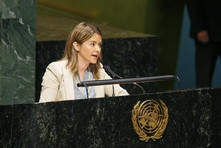
- Special Rapporteur on the right to water and sanitation, Ms. Catarina de Albuquerque
“People are not getting sufficient clean water. Among the factors, especially in my working area, there is a problem of dry weather. It is a very hot area and the community and the herds suffer from water scarcity. There were wells and some springs which have been made by the Catholic Church and by the government but most of them are not functioning because they are out of order and demand a high cost to maintain them. The women have to travel kilometres and kilometres to find water. This is a great difficulty in the lives of women and children. They also die of water-related diseases since it is not easy to get clean water.”
This is part of a testimony from one of FI's partners in Ethiopia on the situation of access to water and sanitation. It demonstrates some of the grave challenges surrounding the issue of the human right to clean water and sanitation. FI recently submitted a written statement for the 21st session of the Human Rights Council which will take place in September. During this session, the Special Rapporteur on the human right to safe drinking water and sanitation, Ms. Catarine de Albuquerque, will deliver her annual report, and FI's statement serves to expand on some of the issues the Special Rapporteur raises. Developed around the testimonies and personal experiences of our partners on the ground, this statement offers valuable insights into the struggle for the realisation of this fundamental, but all too often overlooked, human right.
22/02/2012
Violence against albino children in Africa
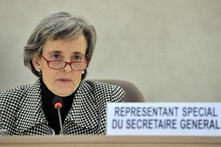
- Special Representative of the Secretary-General on Violence against Children, Ms. Marta Santos Pais.
FI delivered a joint written statement to the Special Representative of the Secretary-General on Violence against Children and the Human Rights and the Human Rights Council to the plight of albino children in the United Republic of Tanzania. In recent years, people with albinism have been subjected to high levels of violence and killed due to witchcraft beliefs that their body parts bring wealth and success to those who consume them. Further, they are often rejected by their families and communities who consider them a "curse" and are subjected to extreme discrimination and stigmatisation. Whilst the Government of Tanzania has highlighted its commitment and progress to addressing the situation, FI believes that there is an urgent need to take immediate action to protect this vulnerable group of children and to eradicate the practice. FI recommends a fully integrated response at the regional, national and international level based on three axes: prosecution, prevention and protection. This should involve coordination amongst different actors, including the Government, civil society, communities, families, schools and children, along with the assistance of the international community.
Read written statement>>
22/02/2012
Widespread incidence of torture in the provinces of Papua and West Papua in Indonesia
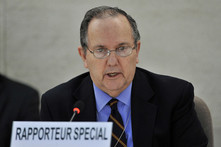
- Special Rapporteur on torture and other cruel, inhuman or degrading treatment or publishment, Mr. Juan Menez.
During the UPR of Indonesia in 2008, the government agreed to ratify the Optional Protocol to the UN Convention against Torture, Cruel, Inhumane and Other Degrading Treatment or Punishment, to include the crime of torture in the criminal code, and to increase its efforts to combat the lack of accountability for human rights violations committed. However provisions have yet to be made in the military and civil penal codes to criminalise torture and the Indonesian security forces continue to use it to extract confessions and maintain order. FI urges the Government of Indonesia to: ensure the Convention against Torture is respected within national law so as to criminalise the procedure of torture; to ensure that military personnel who commit crimes, including torture, against civilians are tried in civilian court; to implement at least one national prevention mechanism.
Read written statement>>
22/02/2012
Child marriage in India
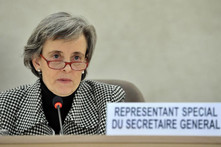
- Special Representative of the Secretary-General on Violence against Children, Ms. Marta Santos Pais.
Further to the annual report of the Special Representative of the Secretary-Gerneral on Violence against Children, FI submitted a written statement to draw attention to the issue of child marriage which is a deeply-rooted tradition in Indian society. The practice is related to socio-cultural, gender, economic and political factors. FI urges the Government of India to improve the situation by taking various actions including the monitoring of the implementation of the 'Prohibition Child Marriage Act' 2006.
Read written statement>>


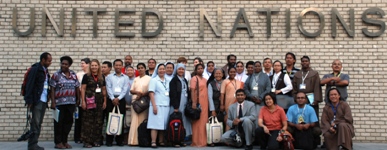

 Franciscans International
Franciscans International

